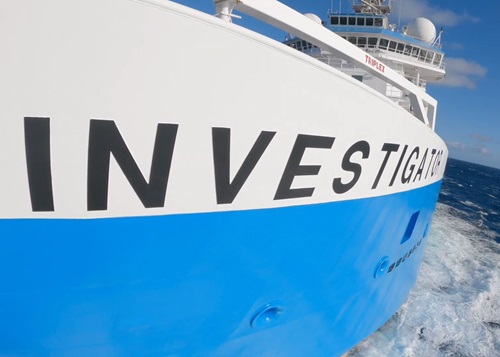Scientists on CSIRO research vessel (RV) Investigator have made some exciting finds during recent voyages, including collecting a specimen of a new species of shark and discovering a shark graveyard in the deep ocean.
The graveyard even contained the fossilised teeth of the ancient ancestor of the megalodon shark.
The discoveries were made on RV Investigator – operated by CSIRO, Australia’s national science agency – during biodiversity surveys in two of Australia’s newest marine parks. The first was a recent voyage to the Cocos (Keeling) Islands Marine Park in the remote Indian Ocean. The second is an underway voyage to the Gascoyne Marine Park off Western Australia. Both voyages have been undertaken for Parks Australia, who manage Australia’s marine parks network.
Shark expert from CSIRO’s Australian National Fish Collection, Will White said one of the most exciting finds of the underway voyage was the collection of a specimen of a new species of shark.
“Early in the voyage, we collected a striking small, stripey hornshark,” said Dr White.
“This species is unique to Australia, but it hasn’t yet been described and named. The specimen we collected will be incredibly important to science because we’ll use it to describe the species," he said.
Hornsharks include the well-known Port Jackson shark and are generally slow-moving species found in shallow waters. They spend most of the day camouflaged among rocks and seaweed on the seafloor and come out at night to feed. However, this new species lives in water over 150 m deep and we know nothing about its behaviour.
Dr White said biodiversity surveys are always exciting as you never know what you might find.
“Australia has a truly enormous marine estate that’s home to some of the most diverse marine life on the planet but we still know very little about what lives beneath the waves,” said Dr White.
“From the very first survey on this voyage, we’ve been making new discoveries and collecting data that will be vital in helping to protect and conserve the life in our oceans," he said.
Chief Scientist on the underway voyage, John Keesing from CSIRO, said the discovery of new species was quite common on biodiversity surveys such as this.
“It’s been estimated that around a third of the species collected on recent biodiversity survey voyages on RV Investigator may be new to science,” said Dr Keesing.
“The discoveries we make aren’t just limited to new species. These voyages give us the opportunity to learn more about marine ecosystems, as well as species range, abundance and behaviour," he said.
Scientists are using a range of equipment to study marine life and seabed habitats in the Gascoyne Marine Park, including underwater towed and remote cameras. Several shark species have been captured on film during the voyage. This includes sharks taking bites of the equipment.
However, one of the more unsual finds on the previous voyage to Cocos (Keeling) Islands was the discovery of a shark graveyard on the seafloor. Scientists, led by the Museums Victoria Research Institute, made the surprising discovery during the final trawl survey of the voyage at a depth of 5400 m. The trawl brought up more than 750 mineralised (fossilised) shark teeth representing a range of predatory species.
Curator of Fishes at the Western Australian Museum, Glenn Moore is on the underway voyage and said the shark teeth came from an interesting mix of modern and ancient sharks.
“The teeth look to come from modern sharks, such as mako and white sharks, but also from ancient sharks including the immediate ancestor of the giant megalodon shark,” said Dr Moore.
“This shark evolved into the megalodon, which was the largest of all sharks but died out about 3.5 million years ago," he said.
The megalodon was considered one of most powerful predators ever to have lived but is only known from fragmentary remains, such as its teeth. Its appearance and maximum size are still uncertain. The teeth collected here are likely from its closest relative, a shark which grew to over 12m long.
Dr Moore said that it was astounding that such a large number of teeth were collected from a relatively small area on the seafloor.
“We’ve also found a few mako and white shark teeth during the underway voyage but nothing like the numbers found during the previous voyage. It’s incredible to think we’ve collected all these teeth in a net from the seafloor some 4 to 5 km below the ocean surface," Dr Moore said.
The discoveries emphasise the importance of marine biodiversity survey voyages and the significant contribution they make to better understanding the life in our oceans.
“From small, new, bottom-dwelling sharks, to massive ancient mega-sharks that once roamed the oceans, these biodiversity surveys give us vital insights into the life in our oceans,” Dr Keesing said.
Parks Australia Head of Division, Jason Mundy said the learnings will help Parks Australia to manage the remote marine parks, now and into the future.
“It shows there is more to learn about our 60 Australian Marine Parks, especially those in deep and difficult to access environments. This is made possible through partnerships with research organisations and universities,” Mr Mundy said.
RV Investigator will continue surveying the Gascoyne Marine Park, as well as the nearby Carnarvon Canyon Marine Park, until mid-December and then end its voyage in Fremantle.
This research is supported by grants of sea time on RV Investigator from the CSIRO Marine National Facility.
Multimedia assets including images can be accessed via Dropbox by clicking here.

